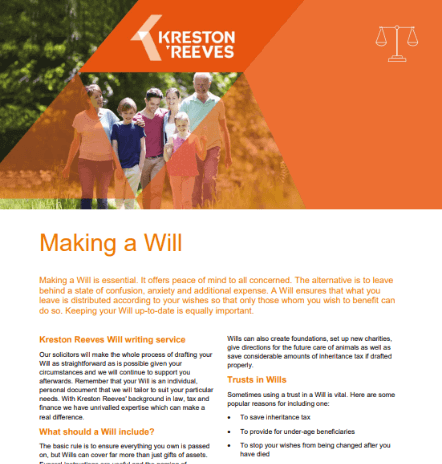Wills and your legacy
You’ve worked hard over the years to accumulate wealth and valued possessions and it is only natural to feel that after your death the assets you leave behind will continue to be a source of support to your family, friends and the causes that are important to you.
A legacy is more than a gift of money – it’s also a gift of love.
To achieve this you must make proper legally binding arrangements now. Believe it or not, there are five basic ways to pass on your assets and they are:
- writing a Will,
- transferring assets to a trust,
- joint ownership,
- beneficiary designation, and;
- lifetime gifts.
By far and the most commonplace method is by writing a Will.
Wills
A Will is the cornerstone of everyone’s estate planning. You should make a Will no matter how much your estate is worth and despite other estate planning strategies you have implemented.
| Some important questions you may need to ask yourself: | |
|---|---|
| Do I want to save inheritance tax? | Who will raise my children if I die unexpectedly? |
| Will my partner be entitled to anything? | Would I mind if my estate is swallowed up by care fees? |
| Who do I trust to look after my children’s inheritance? | Who shall I pass on my business to after I’ve gone? |
| How old should my children be before they can inherit and in what circumstances? | How would I feel if my partner/spouse inherits everything and my children end up with noting? |
| Am I allowed to leave unequal amounts to my children? | Can my Will cover foreign assets? |
By a Will you can leave property in one of three ways;
- by a specific amount of money or item,
- by a residuary gift of a part of, or the whole of your estate
- by leaving assets to a trust
Our expert solicitors prepare Wills tailored to match every client’s individual requirements.
With a Will you can generally leave any type of property to whomever you wish, but there are some important exceptions, including:
- Assets which you have nominated in writing to someone
- Pension funds and death in service benefits
- Assets you use or benefit from, but don’t own, because they are held in trust for you
- Assets you own jointly where rights of survivorship pass them directly to the joint owner(s)
- The rights your surviving spouse, children or partners may have to receive some or all of your estate
- Foreign assets where foreign rights of succession may apply
Joint Ownership
Two (or more) persons can own an asset equally and on the death of one, the other becomes the sole owner (right of survivorship). This is a type of ownership is called a ‘joint tenancy’. There is another type of joint ownership called a ‘tenancy in common’ where there is no right of survivorship. On the death of a tenant in common the deceased’s share of the asset passes under their Will or, in the absence of a Will, to the relatives of the deceased.
You may find joint ownership arrangements are useful and convenient for some assets and not for others. For example, a joint bank account ensures that upon your death the remaining account holder(s) will have immediate access to needed cash and ensures direct debits continue to be paid. Owning assets abroad in this way can also help to avoid complex and expensive foreign procedures
There are some disadvantages to a joint tenancy though, including lack of privacy, a co-owner accessing assets without your approval or forcing you to sell, higher taxes, vulnerability to creditor action if the co-owner has debt problems and loss of your legal right to decide who inherits if you die first.
Expression of Wishes
For all your assets in pensions, life policies, superannuation schemes, death in service benefits and any other trust arrangement you must complete an Expression of Wishes form and ensure its contents are known to the trustees. You will be able to change your wishes at any time by completing a new form. Recipients can be persons or entities such as a charity or a trust and you can name multiple beneficiaries to share the funds. It’s always advisable to name primary and secondary beneficiaries and to avoid naming minor children as beneficiaries. Instead name trustees to hold the money for the minors and state the age you wish them to inherit e.g. I8, 21 or 25. Be sure to remember to update your Expression of Wishes whenever your circumstances change e.g. marriage, divorce, death of a beneficiary.
Lifetime Gifts
There are numerous reasons why you might prefer to pass on an asset during your lifetime rather than via your Will. The most common are based on either the desire to see the recipient benefit sooner rather than later or to minimise inheritance tax and, very often, both apply in equal measure. Almost any asset you own can legally be given away by its transfer to the intended new owner. Cash and possessions can simply be handed over. Gifts of assets like shares or other investments or properties must always involve the signature and registration of legal transfer documents. Remember to take tax advice from a specialist in inheritance tax and capital gains tax before giving away property, business assets or any kind of investment to avoid unwanted tax bills arriving unexpectedly.
Related resources
This site is protected by reCAPTCHA and the Google Privacy Policy and Terms of Service apply.
Subscribe to our newsletters
Our complimentary newsletters and event invitations are designed to provide you with regular updates, insight and guidance.
You can unsubscribe from our email communications at any time by emailing [email protected] or by clicking the 'unsubscribe' link found on all our email newsletters and event invitations.
This site is protected by reCAPTCHA and the Google Privacy Policy and Terms of Service apply.













